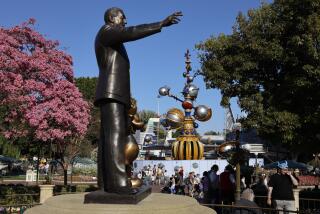Diversity of Parks’ Support Bodes Well for Race Relations in L.A.
The fact that Deputy Police Chief Bernard C. Parks’ support cuts across ethnic lines offers new hope of improved relations in a city where the Police Department has so often been at the center of racial and political discord.
As an African American, raised in South L.A., Parks has deep roots in the black community. It’s interesting to note, however, that Mayor Tom Bradley and other black leaders of an older generation refused to support his bid for chief five years ago, and backed Willie L. Williams.
And the man who selected Parks to be L.A.’s next police chief is Mayor Richard Riordan, who is white and was the overwhelming choice of white voters in the last two mayoral elections.
One of Parks’ great social and political friends is Los Angeles’ most influential Jewish politician, County Supervisor Zev Yaroslavsky.
Those are a couple of powerful friends. But in the long run, perhaps his most important booster is Los Angeles City Councilman Richard Alatorre, the most powerful Latino politician in a city where Latinos finally are emerging as a citywide political force.
*
I observed the close relationship between Parks and Alatorre Wednesday, when the chief-to-be was greeting the City Council.
Parks was standing at the rostrum, with Riordan and City Council President John Ferraro. Alatorre, standing by his seat, to the right of the rostrum, was gesturing to the three men to stand closer together, as if he were an imperious movie director.
I walked over and asked him what he was doing. He said he was trying to make sure they were in position for a tight shot by the TV crews covering the event. He was clearly enthusiastic about Parks and wanted to make sure he was shown on television as part of a Riordan-Ferraro-Parks team.
“Did you see his press conference?” he asked. “He was brilliant.”
He talked about Parks’ rise to chief. Alatorre was still irate about Parks rejection by the older black leaders five years ago. Hopefully for those leaders, Parks doesn’t hold grudges as long as Alatorre does.
Alatorre looked over at Parks’ family, watching from the sidelines. Parks’ wife, Bobbie, Alatorre said, was a real tiger in standing up for her husband. “If I was in a fight, I’d want her on my side,” said the councilman. That was a real compliment from a man who chooses allies carefully for his own frequent battles.
From the way he spoke about Parks and his wife, I could see Alatorre was well acquainted with the Parks clan.
And no doubt the clan appreciates Alatorre’s conduct during a decisive moment in Parks’ life three years ago.
When Chief Williams demoted Parks from assistant chief to deputy chief, the Eastside lawmaker joined with then-Councilman Yaroslavsky in saving Parks from humiliation, and financial harm. They persuaded the council to keep his salary at the higher assistant chief’s level.
If you know the people involved, there’s nothing surprising about this inter-ethnic friendship. “What attracts a lot of people to Bernie, and the reason he cuts across ethnic and philosophical lines, is that people see him as a serious, no-nonsense professional who calls them as he sees them,” said Yaroslavsky.
Still, there is overheated ethnic rhetoric that explodes whenever it’s time to fill a top job in L.A, whether it be school superintendent, MTA boss or chief of police.
In the case of police chief, some Latino leaders argued for a Latino chief this time around. They said there were qualified Latino choices, and that one of them should get the job because of the city’s growing Latino population.
As the behind-the-scenes race for chief heated up, some of Parks’ African American supporters were angered by the Latino drive. But Alatorre told Parks’ supporters to cool it, that their candidate would need the support of all ethnic groups when he became chief. He recalled telling them “there’s a new day” in L.A.
*
With such support, Parks comes to his new job remarkably free of the ethnic controversy that dogged his predecessors.
He’s not in debt to the black leaders who rejected him five years ago. His support by Alatorre--and the councilman’s influential associates--assures Parks’ standing in the Latino community. Backing by the mayor and Yaroslavsky means he will be enthusiastically welcomed in the white precincts of the Westside and the west and northwest San Fernando Valley. Now all he has to do is get to work in the Asian community to complete his circuit of politically influential stops in L.A.’s new multiethnic world.
Free of baggage, Parks embarks on a journey that could help push Los Angeles toward a goal that lately has seemed further out of reach than ever--racial peace.
More to Read
Sign up for Essential California
The most important California stories and recommendations in your inbox every morning.
You may occasionally receive promotional content from the Los Angeles Times.










